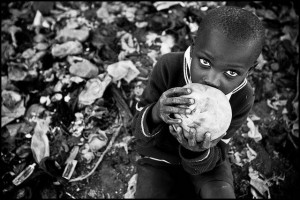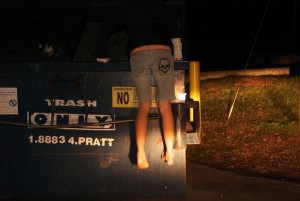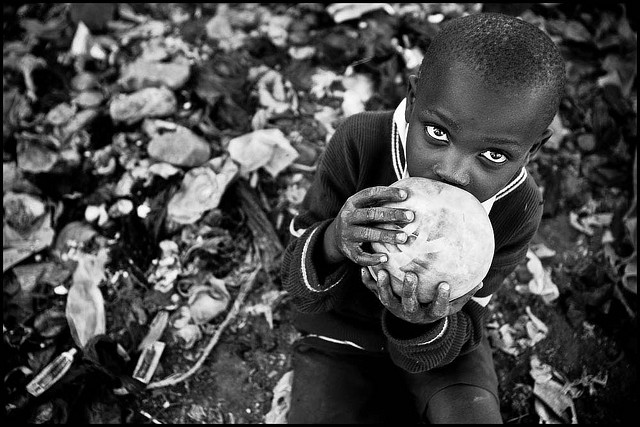It was after a particularly depressing lecture towards the end of last year, that I found myself along with a handful of people from my course, remaining in class while everyone else was leaving the room. We were just gazing, staring holes into the wall and, for what felt like an eternity, no one was talking nor moving at all. Finally someone broke the silence and we exchanged thoughts on how weird it felt to gradually unravel all the misery that had been hidden from us for years, while simultaneously continuing to live a lifestyle that, at least partially, contributed to all the inequality we despise so much. We felt so small. I felt so small.
However, we began to brainstorm on what we could do and eventually came up with a project we saw fit. The idea was to live on 1€ a day – a number corresponding to what is today recognized as the international poverty threshold, and donate the money we would “save” over the span of a month, to charity. The project was supposed to be open source – everyone could join. We started to draft the outlines and ran through possible scenarios – imagined how we might mobilize and inspire not only people from the area but also from our home countries to get a universal message out into the world. We began to talk with others about our plans and were surprised by the amount of interest on the one hand, and the amount of criticism on the other.
After all, it seemed, things were not as easy as we had initially assumed, and that this purely well-intentioned project, might echo some severely negative consequences if framed, let alone conducted, with only a minimal amount of imprecision. We kept pushing our deadlines, met again and again, and discussed our agenda. What is this about?  Solidarity? Awareness? Experiencing? Sharing, learning, inspiring, teaching, preaching, practicing – the list of possible motives was endless. We needed a focus, yet most of us had different ideas of what exactly we were trying to say. Why was it so hard to materialise good intentions?
Solidarity? Awareness? Experiencing? Sharing, learning, inspiring, teaching, preaching, practicing – the list of possible motives was endless. We needed a focus, yet most of us had different ideas of what exactly we were trying to say. Why was it so hard to materialise good intentions?
Overwhelming enthusiasm faded into bitter realisation.
At one point, our group of four split, as we realised that the deviation in terms of the message we tried to convey were just too grave to compromise. Then it was Christmas. Our initial plan had been to have everything set by now, so we could talk about it with friends and family at home and in between. Instead, we had nothing and were back to ground zero. All this big talk about how we could make the world a better place suddenly seemed like a childish fantasy of a different era. I felt ridiculous.
After New Years, being back in Sweden, life slowly picked up its pace again after I had lived in this timeless bubble you generate when heading home and seeing all the familiar faces over Christmas. It was a couple of days later, I was sitting in our kitchen and writing a paper on Enemy Images for uni, when my flatmate suddenly walked in and casually asked: “so when do we start with the project?” It was in this moment that I realised how important this thing still was. After all these considerations, a submission not only felt like a personal failure, but a loss in terms of the bigger picture of doing the right thing.
We decided to do it alone. No other people, no outlines, no website, no donations. No complications, no nothing. Why not just do it ‘for ourselves’, and see what happens? Instead of getting lost in the process of planning every minute detail, we focused on just doing it. Excluding rent from our considerations was obvious, but also synonymous with the limitations and phoniness of the project. We quickly came to realise that we were no ‘Weltverbesserer’, but just a group of spoiled daydreamers – a bunch of idealists with a sweet vision of how we thought the world should work.
Things got rolling on the 1st February and the magic word was “dumpster diving”. Every day, we would have a short tour from supermarket to supermarket, searching for thrown food, and then recycling it, if you so chose to. When we had a particularly good day we would invite friends over and share an evening of cards over urban game. The social exclusion we had initially assumed to encounter shifted into social inclusion, while the amount of surplus food became at times unbearable. The feeling when you find 20 kg of perfect bananas or 30 packs of mushrooms in a single bin of a single supermarket, in one city, in one country is equally triumphant as it is depressing. We would always leave food for others, yet tried to reduce the gross of what would  eventually find its way into the relentless maw of the waste combustion. Days passed and rather than getting harder, things got easier as we worked on our timing and developed new ways of using the occasionally odd food we would find – in fact, we started eating healthier than ever before.
eventually find its way into the relentless maw of the waste combustion. Days passed and rather than getting harder, things got easier as we worked on our timing and developed new ways of using the occasionally odd food we would find – in fact, we started eating healthier than ever before.
Fast forward: 1st March. On a personal level, I would say, that this project brought us all closer together than we had already been before. But most importantly, we all learned something. My personal epiphany has a social component: money doesn’t make you happy, and the best things in life are free. However, I enjoy sharing with friends – while I, honestly, wouldn’t need money to provide for myself, it was the pleasure of inviting your friends for a kebab or your missus for a coffee, that made me yearn for the end of the month. We ended up spending 100 KR each and shared a meal virtually every evening of the month. But further than that, we raised awareness for the madness of global food distribution, made some people reconsider their lifestyle and inspired others to tag along when roaming from dumpster-to-dumpster. Friends discovered the merits of the niche, and began their own tours to reap the fruits of the Western surplus system. We came to ask ourselves “how do you define ‘making the world a better place’?” Isn’t inspiring a single person already a success?
I hope that, on top of just uttering the usual criticism of consumer society, I was able to make a point in favour of confidence. Believe in yourself, and don’t let setbacks or changing circumstances blur your vision or even get you off the track all together. It sounds corny, but it’s true: the journey is its own reward, and insights you might acquire in the process of planning a project might be as much of an achievement as its actual realisation. If you have an idea, get it out there. Here is a rule this whole thing revealed to me: no matter, whether we talk about planning a project, consumerism, or life in general – there is always an alternative.
By Dennis Arndt
Image Credit:
Picture 1: Zoriah, licensed under CC BY-NC 2.0
Picture 2: Wei Tchou, licensed under CC BY 2.0





